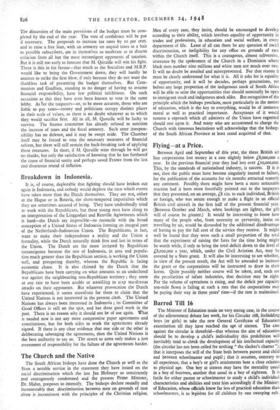Breakdown in Indonesia.
It is, of course, deplorable that fighting should have broken out again in Indonesia, and nobody would deplore the turn which events have taken more than the Dutch themselves. They are not, either at the Hague or in Batavia, the short-tempered imperialists which they are sometimes accused of being. They have undoubtedly tried to work with the Republicans, but these young men have clung to an interpretation of the Linggadjati and Renville Agreements which is hard—the Dutch say impossible—to reconcile with the broad conception of a United States of Indonesia forming an integral part of the Netherlands-Indonesian Union. The Republicans, in fact, want to make their independence a reality and the Union a formality, while the Dutch naturally think first and last in terms of the Union. The Dutch are the more irritated by Republican intransigence because the rest of Indonesia, in area and popula- tion much greater than the Republican section, is working the Union well, and prospering thereby, whereas the Republic is facing economic chaos. It is also claimed by the Dutch that the Republicans have been carrying on what amounts to an undeclared war against the neighbouring non-Republican territory ; they seem at any rate to have been unable or unwilling to stop murderous attacks on their opponents. But whatever provocation the Dutch have experienced, it seems unrealistic for them to claim that the United Nations is not interested in the present clash. The United Nations has always been interested in Indonesia ; its Committee of Good Offices is still on the spot, and has done good work in the past. There is no reason why it should not be of use again. 'that is needed now is not any more compromise paper agreements and constitutions, but for both sides to work the agreements already signed. If there is any clear evidence that one side or the other is deliberating sabotaging the agreements, then the United Nations is the best authority to say so. The resort to arms only makes a just assessment of responsibility for the failure of the agreements harder.


































 Previous page
Previous page